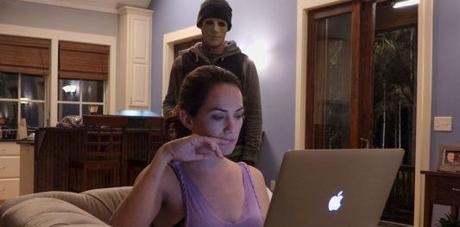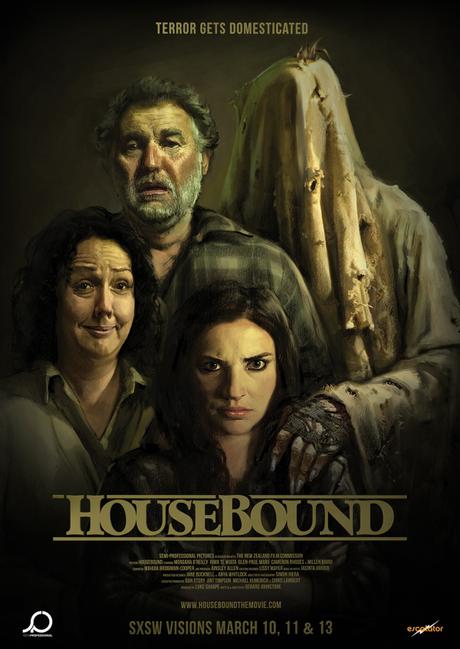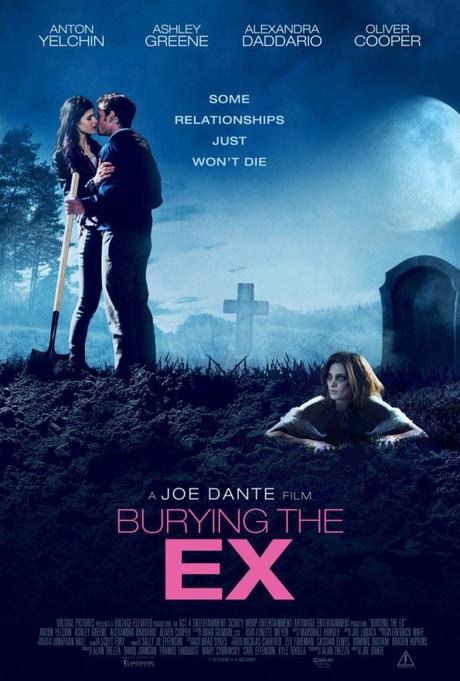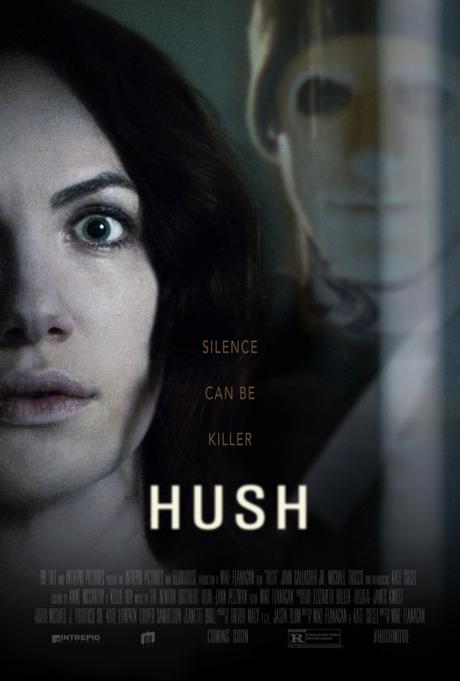
While sifting through Netflix, Hulu or Amazon, it can be difficult to discern if the horror title you've landed upon is a genuine movie worth your time or something with production values even a late-night Cinemax producer would laugh at. There are obvious exceptions, i.e., certain movies whose box covers betray their budgets, and yet others you'll instantly remember from their original theatrical run (if, indeed, they ever had one). However, often times the films are ill-served by misleading or simply bland box covers/titles and feature actors you've never heard of before.
All of that might be why I currently have so many unwatched horror movies in my Netflix queue. With Don't Breathe lighting up the box office this weekend, though, I thought it was a good time to finally give a couple of Netflix's supposed finest horror offerings a chance. That's how a lazy Sunday afternoon spent with fellow WMIF'er Julianne turned into a mini-horror movie marathon consisting of Housebound, Burying the Ex (well, half of it) and Hush. Throughout this self-selected marathon, we laughed, we cringed, we looked away, sometimes from a close-up of someone's broken bones, other times because shielding our eyes was preferable to enduring Burying the Ex a single minute longer.
Here's a movie-by-movie breakdown:
Housebound

As ignorant as this sounds, outside of Peter Jackson and Flight of the Conchords New Zealand hadn't really registered on my pop culture radar before What We Do In the Shadows, which the internet seemed to fall in love with last year. As a film, Shadows is not without its flaws, but it is admirably idiosyncratic, featuring scenes in which age-old vampires encounter the glory of the internet or muddle through a roommate meeting where they absolutely must get to the bottom of the dirty kitchen situation. There's a charm and wit to all of it which recalls Conchords to the point I wondered if all New Zealand cinema has a similar quirky tone.
Enter Housebound, a fellow New Zealand production which actually premiered two months after Shadows in early 2014 but failed to make much of a dent, both critically and financially. To be clear, Housebound, unlike Shadows, is not a mockumentary. It doesn't star anyone you'd know, either from Flight of the Conchords or anywhere else for that matter. The best you'll get is the occasional flash of, "Oh, that's the more famous actor they kind of look like," while looking at the New Zealand cast (e.g., one of the actors resembles a young Jim Broadbent). Instead, Housebound is a traditional haunted house story filtered through distinct New Zealand sensibilities, with a scene-stealing performance from the main girl's (Kylie, played by Morgana O'Reilly) talkative mother (Miriam, played by Rima Te Wiata) who insists on politeness even in the face of supernatural or human horror.
The unceasingly winning tone hits you right away in the opening scene when Kylie's companion idiotically knocks himself out during their attempted robbery of an ATM machine. His dead weight drags her down and leads to her arrest. As a repeat offender, Kylie is assigned to 8 months of house arrest in her childhood home, forced to again cohabitate with her cherry mum and taciturn step-father. Upon seeing her daughter's court-mandated ankle bracelet for the first time, Miriam happily rattles on about the splendid new technology Kylie is getting to play with.
And that's how Housebound progresses for a while - a domestic drama centered around a sullen woman adrift in life and her perpetually smiling mother raining down one-liners over everything. The story pivots toward the supernatural once Kylie begins to notice signs of what her mother had long since claimed, namely that the house is haunted. Kylie's friendly parole officer turns out to be an amateur ghosthunter, and instantly throws in to help them, leading the trio down all the wrong paths before finally discovering the truth of the house and the haunting, with the script drawing some obvious metaphoric parallels between the details of the haunting and Kylie's life.
First-time director Gerard Johnston's inexperience (or maybe his limited budget) shows from time to time in the form of various plotholes created through poor editing, but overall Johnston displays immense promise with an impeccable knack for balancing the horror with the comedy. The final fight between good and evil, so to speak, is particularly stellar, masterfully alternating between the comically absurd and moments of squirm-inducing violence. In the end, this might actually be a more complete film than Shadows, and was an excellent start to the marathon.
Burying the Ex

I take full responsibility for this one, at least in terms of its placement in this marathon. Julianne steered me toward Housebound, and I then steered us toward Burying the Ex, Joe Dante's 2014 "my girlfriend's back as a zombie, and it's getting in the way of my new relationship" film. I assumed it would at least entertain as an intentional call back to a campier time in the horror genre. Come on - Dante made both Gremlins movies, and is always a fun interview on podcasts and in horror movie documentaries. He's still got some magic left in him, even if it's seriously diluted by this point, right?
The deal was we could stop watching if we knew Ex wasn't good within the first 10 minutes, and Juli knew within the first three.
The film opens on Anton Yelchin (let not this be your last memory of him) quietly exiting his bedroom in the morning so as not to wake up his girlfriend. He almost immediately happens upon the remnants of a threesome in his living room as two half-naked girls and one guy (Oliver Cooper) are sleeping on his couch. Turns out, the guy is his half-brother who regularly brings girls back to Yelchin's apartment and doesn't get why Yelchin and his girlfriend (Ashley Greene) wouldn't be cool with that. The half-brother brags about his sexual prowess as he drinks orange juice to replenish his electrolytes, and Yelchin mostly mumbles.
Everything about this opening is off. Yelchin plays it too small. Cooper plays it too big and isn't particularly convincing as a lothario. The tone, direction, blocking, writing and cinematography has the unsettling vibe of a long lost, especially sleazy 90s teen comedy. And the presence of hip, vintage B-movie posters on all of the walls behind the characters invites thoughts such as "Did those posters come straight from Dante's personal collection?"
Sadly, from this point forward nothing about Burying the Ex really works. A magical totem is introduced as the obvious eventual cause of the girlfriend's surprising zombieism, yet it is then forgotten and largely misused. The script's various attempts to make the girlfriend a contemptible figure might as well just be the screenwriter telling us, "Bitches, right?" And a prolonged bit of mourning and depression for Yelchin's character after the girlfriend dies feels unearned and out-of-step with the immediately preceding scenes where he plotted his eventual break-up with her.
Rather than coming off as a clever homage to campy films of yesteryear, Burying the Ex feels more like someone's immature fantasy is being indulged. You're not sure whose fantasy, exactly - the director's?, writer's?, intended audience of horror convention dudes? - you just know it's not your's.
That sense of "someone's fantasy is seriously being served here" permeates every plot point. We learn Yelchin runs a horror novelty shop, and that his girlfriend happily wears a slutty nurse outfit and has sex with him at his store. We meet an even hotter girl (Alexandra Daddario, with slight purple highlights because, hey, that means kooky, right?) who works at a boutique ice cream shop which bases its flavors on obscure pop culture trivia. Of course, she and Yelchin instantly hit it off like two nerds at a comic book convention, and she, after Yelchin's girlfriend dies, just happens to be at the same double showing of old horror movies as him. They gleefully walk through a cemetery together afterward, which is exactly when the girlfriend comes back as a super horny, quasi-zombie (she's completely articulate and makes no initial effort to eat anyone's brain) eager to pick up where she left off with Yelchin.
And that's when we finally stopped watching. At the halfway point of the film, Yelchin is stuck in a French farce, turning a hot-to-trot Daddario away from his doorstep while his newly returned zombie girlfriend showers as prelude to reunion sex (well, almost-sex - he faints before anything happens). It's supposed to be hilarious, yet it feels one-step away from leaning on a 2 and a Half Men laugh track or having Joe Dante walk right into frame and ask, "Can you believe this? How is he going to get out of this jam?"
We only made it that far because I insisted after such a lackluster opening the film might be fun to watch and mock, Mystery Science Theater-style, but the jokes ran dry, both on our end and definitely on the film's end.
Burying the Ex was ultimately buried by the critics when it was first released, and it was foolish of us to dig it back up. Buried deep, deep in the ground is where it should stay.
Hush

The plot is simple: A deaf woman (Kate Siegel), alone in her remote home in the woods, squares off against a murderer (John Gallagher, Jr.) who chooses to toy with her rather than kill her outright. For example, rather than simply throwing a rock through one of the windows and forcing his way in the bad guy methodically patrols the borders of the house in search of an access point the woman might have missed. Viewing his actions through the house's many windows, the woman desperately races to lock everything up and figure out ways to defend herself should he make it in.
From Blumhouse Productions, Hush is the latest in the increasingly long line of micro-budget indies filmed on the quick either mostly or entirely in a single house. This unique subset of cost-efficient films spans multiple genres, from rom-com () to sex comedy (The Overnight) to sci-fi dramedy ( It's a Disaster) to Big Chill-mimicry ( About Alex, The Intervention). However, no genre is better served by such forced minimalism than horror, and Hush might be the best example of that, perfectly stretching out such a seemingly thin scenario by playing it almost entirely in real time and offering the central character small victories followed by swift defeats in her fight for survival.
The set-up might remind some of any number of prior home invasion films (e.g., Straw Dogs), but the one I gravitated toward was Fincher's Panic Room, with the woman's entire house in Hush being like the panic room the bad guy wants into. Except here the bad guy's goal is not to rob but instead to kill, and, obviously, neither of the potential victims (Jodie Foster, Kristen Stewart) in Panic Room were deaf.
On that last note, Hush can be said to be of a piece with the horror genre's recent fascination with tweaking the familiar by adding in central characters with disabilities, from the wheelchair-bound protagonists of Curse of Chucky and Jesabelle to the agoraphobic woman pulling a horror Home Alone on would-be robbers in Intruders to Stephen Lang's terrifying blind man in Don't Breathe. Adding in such characters makes the old seem new again, and significantly enhances vulnerability and curries audience sympathy. In the case of Don't Breathe and Hush, it's also a serious boon to sound designers who likely relish the chance to create scares by creating sonic moods which mimic exactly what a blind man would hear or what a deaf woman wouldn't hear.
However, for such moods to be effective you need credible performances, and Hush 's chief cast of Kate Siegel and John Gallagher prove uniquely capable, the former a revelation as she alternates between unthinkable fear and grim determination and the latter brilliantly infusing his character's obvious sociopathy into his every step.
As a result, there is nary a missed step in the entirety of Hush, a film which even takes an overused trope (i.e., the central character is a writer) and manages to turn it into something remarkably compelling and clever. Anyone who liked Don't Breathe and hasn't seen Hush yet should rectify that immediately.
THE VERDICT: Put Housebound in your queue, avoid Burying the Ex like the plague and stop everything you're doing and watch Hush right now.

